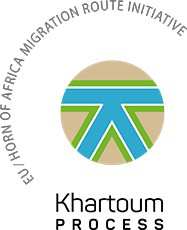Following the three webinars in the 4Ps Revisited Webinar Series, on Prevention, Protection, and Prosecution, the Khartoum Process Secretariat, in cooperation with the Khartoum Process Chair – The Netherlands – organised on 30 June 2021 the last webinar in the series. Naturally, this last webinar focused on Partnership.
The issue of partnership being a cross-cutting one, the first three webinars naturally touched on the importance of partnerships in all areas of work linked to the fight against human trafficking. On these occasions, it has been illustrated how the prevention of this crime, the protection of the victims, and the prosecution of the criminals cannot be successfully achieved without multi-agency, multi-level, cross-border cooperation and partnership.
Against this backdrop, the aim of the fourth and last webinar was to go deeper into the topic of fostering partnerships to combat human trafficking by looking at a number of good practices previously not explored in the framework of the webinar series. Several existing cross-sectoral initiatives in the financial and technology sector, as well as examples of institutional partnerships were explored, in the hope that these emerging types of partnerships will provide inspiration for our partners in the Khartoum Process region, for new and innovative future endeavours.
A first example of partnership was introduced by Mr. Vincent Cochetel, UNHCR. The Rapid Alert System (RAS), a collaborative approach currently being piloted by IOM, UNODC, and UNHCR, is aimed at acting and responding to information about victims of trafficking and others in vulnerable situations by referring information directly or through a third party.
Further, Mr. James Kofi Annan presented the work of the Finance Against Slavery and Trafficking (FAST) initiative, looking at the role of the finance sector in the global efforts to tackle human trafficking. Considering the size of the financial flows associated with this crime, his presentation highlighted the importance of mobilising the finance sector in the fight against human trafficking.
Given the ever increasing and more sophisticated use of technology for the purpose of human trafficking operations, part of the webinar was allocated to discussions on partnerships with the tech sector. The Tech against Trafficking platform, presented by Ms. Thi Hoang (Gi-TOC), is a coalition of technology companies collaborating with global experts to help eradicate human trafficking using technology. This was followed by a short video from Microsoft addressing their commitment to supporting anti-trafficking efforts and making tools available to combat human trafficking. Mr Neil Giles presented the Traffik Analysis Hub, a collaboration across multiple sectors united by the common goal of preventing human trafficking and the damage it does to humanity, by using AI technology for data collection and visualisation.
Ms Mercy Otieno of HAART Kenya outlined the role of multiagency partnerships and the key role played by NGOs in this constellation. Her presentation concluded with a video-recorded testimony of a survivor, illustrating the real life impact of anti-trafficking efforts.
